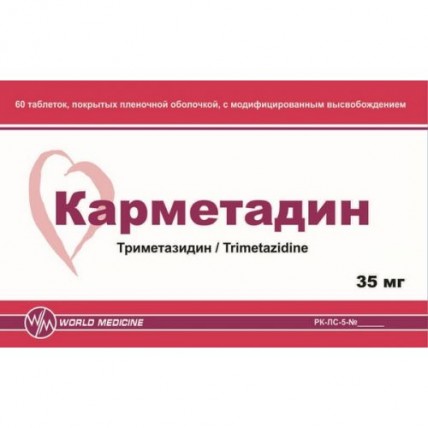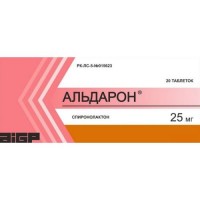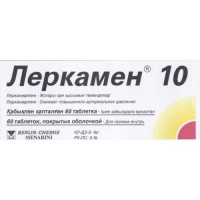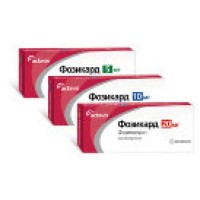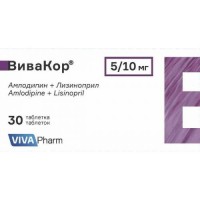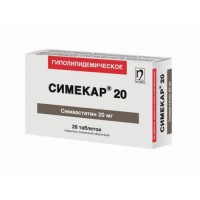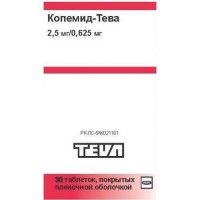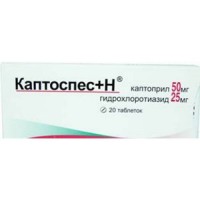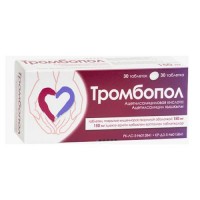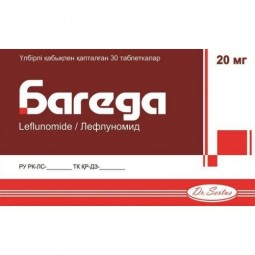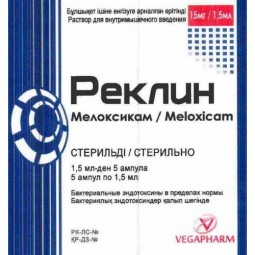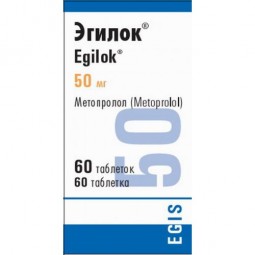CARMETADIN (Trimetazidine) 35 mg, 60 tablets
- $21.00
Other brand names: Vastarel, Moduxin, Matenol, Tacirel LM, Angiozil Retard, Trimet, Cardimax
One tablet of Carmetadin (Trimetazidine) contains:
After oral administration, trimetazidine is rapidly and completely absorbed. The maximum concentration (Cmax) is reached after 5 hours. For more than 24 hours, the plasma concentration of the drug remains at a level exceeding 75% of the concentration determined after 11 hours. Eating does not affect the pharmacokinetic properties of trimetazidine.
Steady state (Css) is reached after 60 hours. The volume of distribution (Vd) is 4.8 l/kg, which implies good tissue diffusion. Plasma protein binding is low, about 16% (in vitro).
Trimetazidine is excreted from the body mainly by the kidneys in unchanged form. The half-life (T1 / 2) is about 7 hours, in patients over 65 years old - about 12 hours.
Renal clearance of trimetazidine is directly correlated with creatinine clearance, and hepatic clearance decreases with age.
Carmetadin is a cardiac antianginal drug. By supporting energy metabolism in cells prone to hypoxia or ischemia, trimetazidine prevents a decrease in the level of intracellular ATP, which ensures the proper functioning of ion pumps and transmembrane sodium-potassium flow, while maintaining cellular homeostasis.
Carmetadin optimizes energy metabolism in the heart due to the partial suppression of fatty acid oxidation by inhibiting long-chain 3-ketoacyl CoA thiolase (3-CAT). This leads to an increase in glucose oxidation and improved coupling of glycolysis with glucose oxidation, providing protection to the heart during ischemia. Trimetazidine also increases the exchange of membrane phospholipids and their incorporation into the membrane, which enhances the protection of the membrane from damage.
The antianginal properties of the drug are based on the transition of the preferred energy substrate from the oxidation of fatty acids to the oxidation of glucose.
Adults as adjunctive therapy for the symptomatic treatment of patients with stable angina that is not well controlled or intolerant to first-line antianginal drugs
Karmetadin should be taken 1 tablet 2 times a day (morning and evening) during meals, without chewing, drinking water.
Tablets should be swallowed with water during meals.
A single dose is 35 mg, daily - 70 mg.
The duration of therapy is set individually. The benefit of treatment should be assessed after 3 months of treatment with Carmetadin, if there is no effect, treatment should be discontinued.
Patients with renal insufficiency
In moderate renal insufficiency (creatinine clearance 30-60 ml / min), the recommended dose is 1 tablet of 35 mg in the morning during breakfast.
Elderly patients
In elderly patients, due to the age-related decrease in kidney function, the elimination period of the drug is extended, so select the dose with caution. The recommended dose is 1 tablet of 35 mg in the morning during breakfast.
Often
- dizziness, headache
- abdominal pain, diarrhea, dyspepsia, nausea, vomiting
- rash, pruritus, urticaria
- asthenia
Seldom
- palpitations, extrasystole, tachycardia
- arterial hypotension; orthostatic hypotension, which may be associated with malaise, dizziness, or a fall in the patient, especially in those patients receiving antihypertensive drugs
- hyperemia
Frequency unknown
- symptoms of parkinsonism (tremor, akinesia, hypertension), unsteady gait, restless legs syndrome, other movement disorders, usually reversible after discontinuation of the drug
- constipation
- arterial hypertension
- acute generalized exanthematous pustulosis, angioedema
- agranulocytosis, thrombocytopenia, thrombocytopenic purpura
- hepatitis
- sleep disorders (insomnia, drowsiness)
- hypersensitivity to the active substance or to any of the excipients
- Parkinson's disease, parkinsonian symptoms, tremors, restless leg syndrome and other movement disorders
- severe renal dysfunction (creatinine clearance<30 ml/min)
- children and adolescents under 18 years of age (efficacy and safety have not been established)
- pregnancy and lactation
There are no data on interactions with other drugs.
The drug is used for the basic therapy of angina pectoris, but not for the relief of angina attacks, the use is not indicated as an initial treatment for unstable angina or myocardial infarction.
In the event of an angina attack, treatment (drug therapy or revascularization) should be reviewed and adapted.
Carmetadin can cause or worsen the symptoms of parkinsonism (tremor, akinesia, increased tone), so regular monitoring of patients, especially the elderly, should be carried out. In doubtful cases, patients should be referred to a neurologist for an appropriate examination.
With the appearance of motor disorders, such as symptoms of parkinsonism, restless legs syndrome, tremor, instability in the Romberg position and "unsteadiness" of the gait, Carmetadin should be permanently canceled.
Such cases are rare and symptoms usually disappear after discontinuation of therapy: in most patients - within 4 months after discontinuation of the drug. If the symptoms of parkinsonism persist for more than 4 months after discontinuation of the drug, a neurologist should be consulted.
There may be cases of falling associated with instability in the Romberg position and "shaky" gait or a pronounced decrease in blood pressure, especially in patients taking antihypertensive drugs.
Due to the lack of clinical data, the administration of the drug is not recommended for patients with renal insufficiency with creatinine clearance less than 15 ml / min, as well as for patients with severe liver dysfunction.
The use of the drug for the treatment of the elderly does not require dose adjustment.
Carmetadin should be used with caution in patients over 75 years of age.
Application in pediatrics
There are insufficient data on the safety of the drug in children and adolescents under the age of 18 years.
Features of the effect of the drug on the ability to drive a vehicle or potentially dangerous mechanisms
In the course of clinical studies, no effect of trimetazidine on hemodynamic parameters was revealed, however, during post-registration use, cases of dizziness and drowsiness were observed, which may affect the ability to drive vehicles and perform work that requires an increased speed of physical and mental reactions.
Symptoms: arterial hypotension, hot flashes.
Treatment: symptomatic
Store at a temperature not exceeding 25ºС.
Keep out of the reach of children!
Shelf life - 3 years
Do not use after the expiration date.
One tablet of Carmetadin (Trimetazidine) contains:
- Active ingredients - Trimetazidine dihydrochloride 35 mg,
- Excipients: calcium hydrogen phosphate anhydrous 60 mg, colloidal anhydrous silicon dioxide 8 mg, polyethylene oxide 73 mg, povidone 2 mg, xanthan gum 30 mg, magnesium stearate 2 mg,
- Shell composition: Opadry® II brown 85G565010 (polyvinyl alcohol, talc, polyethylene glycol / macrogol, titanium dioxide (E 171), soy lecithin, iron oxide red (E 172)), magnesium stearate, glycerin.
Pharmacological properties
Pharmacokinetics
After oral administration, trimetazidine is rapidly and completely absorbed. The maximum concentration (Cmax) is reached after 5 hours. For more than 24 hours, the plasma concentration of the drug remains at a level exceeding 75% of the concentration determined after 11 hours. Eating does not affect the pharmacokinetic properties of trimetazidine.
Steady state (Css) is reached after 60 hours. The volume of distribution (Vd) is 4.8 l/kg, which implies good tissue diffusion. Plasma protein binding is low, about 16% (in vitro).
Trimetazidine is excreted from the body mainly by the kidneys in unchanged form. The half-life (T1 / 2) is about 7 hours, in patients over 65 years old - about 12 hours.
Renal clearance of trimetazidine is directly correlated with creatinine clearance, and hepatic clearance decreases with age.
Pharmacodynamics
Carmetadin is a cardiac antianginal drug. By supporting energy metabolism in cells prone to hypoxia or ischemia, trimetazidine prevents a decrease in the level of intracellular ATP, which ensures the proper functioning of ion pumps and transmembrane sodium-potassium flow, while maintaining cellular homeostasis.
Carmetadin optimizes energy metabolism in the heart due to the partial suppression of fatty acid oxidation by inhibiting long-chain 3-ketoacyl CoA thiolase (3-CAT). This leads to an increase in glucose oxidation and improved coupling of glycolysis with glucose oxidation, providing protection to the heart during ischemia. Trimetazidine also increases the exchange of membrane phospholipids and their incorporation into the membrane, which enhances the protection of the membrane from damage.
The antianginal properties of the drug are based on the transition of the preferred energy substrate from the oxidation of fatty acids to the oxidation of glucose.
Indications for use Carmetadin
Adults as adjunctive therapy for the symptomatic treatment of patients with stable angina that is not well controlled or intolerant to first-line antianginal drugs
How to take Carmetadin?
Karmetadin should be taken 1 tablet 2 times a day (morning and evening) during meals, without chewing, drinking water.
Tablets should be swallowed with water during meals.
A single dose is 35 mg, daily - 70 mg.
The duration of therapy is set individually. The benefit of treatment should be assessed after 3 months of treatment with Carmetadin, if there is no effect, treatment should be discontinued.
Patients with renal insufficiency
In moderate renal insufficiency (creatinine clearance 30-60 ml / min), the recommended dose is 1 tablet of 35 mg in the morning during breakfast.
Elderly patients
In elderly patients, due to the age-related decrease in kidney function, the elimination period of the drug is extended, so select the dose with caution. The recommended dose is 1 tablet of 35 mg in the morning during breakfast.
Possbile side effects
Often
- dizziness, headache
- abdominal pain, diarrhea, dyspepsia, nausea, vomiting
- rash, pruritus, urticaria
- asthenia
Seldom
- palpitations, extrasystole, tachycardia
- arterial hypotension; orthostatic hypotension, which may be associated with malaise, dizziness, or a fall in the patient, especially in those patients receiving antihypertensive drugs
- hyperemia
Frequency unknown
- symptoms of parkinsonism (tremor, akinesia, hypertension), unsteady gait, restless legs syndrome, other movement disorders, usually reversible after discontinuation of the drug
- constipation
- arterial hypertension
- acute generalized exanthematous pustulosis, angioedema
- agranulocytosis, thrombocytopenia, thrombocytopenic purpura
- hepatitis
- sleep disorders (insomnia, drowsiness)
Contraindications
- hypersensitivity to the active substance or to any of the excipients
- Parkinson's disease, parkinsonian symptoms, tremors, restless leg syndrome and other movement disorders
- severe renal dysfunction (creatinine clearance<30 ml/min)
- children and adolescents under 18 years of age (efficacy and safety have not been established)
- pregnancy and lactation
Drug Interactions
There are no data on interactions with other drugs.
Special instructions
The drug is used for the basic therapy of angina pectoris, but not for the relief of angina attacks, the use is not indicated as an initial treatment for unstable angina or myocardial infarction.
In the event of an angina attack, treatment (drug therapy or revascularization) should be reviewed and adapted.
Carmetadin can cause or worsen the symptoms of parkinsonism (tremor, akinesia, increased tone), so regular monitoring of patients, especially the elderly, should be carried out. In doubtful cases, patients should be referred to a neurologist for an appropriate examination.
With the appearance of motor disorders, such as symptoms of parkinsonism, restless legs syndrome, tremor, instability in the Romberg position and "unsteadiness" of the gait, Carmetadin should be permanently canceled.
Such cases are rare and symptoms usually disappear after discontinuation of therapy: in most patients - within 4 months after discontinuation of the drug. If the symptoms of parkinsonism persist for more than 4 months after discontinuation of the drug, a neurologist should be consulted.
There may be cases of falling associated with instability in the Romberg position and "shaky" gait or a pronounced decrease in blood pressure, especially in patients taking antihypertensive drugs.
Due to the lack of clinical data, the administration of the drug is not recommended for patients with renal insufficiency with creatinine clearance less than 15 ml / min, as well as for patients with severe liver dysfunction.
The use of the drug for the treatment of the elderly does not require dose adjustment.
Carmetadin should be used with caution in patients over 75 years of age.
Application in pediatrics
There are insufficient data on the safety of the drug in children and adolescents under the age of 18 years.
Features of the effect of the drug on the ability to drive a vehicle or potentially dangerous mechanisms
In the course of clinical studies, no effect of trimetazidine on hemodynamic parameters was revealed, however, during post-registration use, cases of dizziness and drowsiness were observed, which may affect the ability to drive vehicles and perform work that requires an increased speed of physical and mental reactions.
Overdose
Symptoms: arterial hypotension, hot flashes.
Treatment: symptomatic
How to store Carmetadin?
Store at a temperature not exceeding 25ºС.
Keep out of the reach of children!
Shelf life - 3 years
Do not use after the expiration date.
